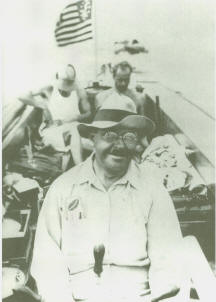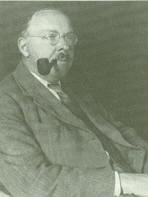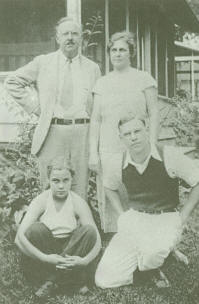John Andrew Rice (1888-1968):
Controversial Professor, Founder of Black Mountain College
John Andrew Rice, born on February
1, 1888 to John Andrew and Anna Bell (Smith) Rice, originated in Lynchburg,
South Carolina. His father had functioned as a college president (Colombia
College in South Carolina), professor (Southern Methodist University in
Dallas, Texas), and pastor. Rice attended the Webb School in Bell Buckle,
Tennessee, where he received his pre-college preparatory education. From
1908 until 1911 he attended Tulane University in New Orleans, Louisiana, and
received an Artium Baccalaureatus degree. Rice earned another A.B.
(F irst Class in the Final Honour of School Jurisprudence) in 1914 from
Oxford University, where he held the distinction of Rhodes Scholar, after
which he conducted graduate work in the classics at the University of
Chicago from 1916 through 1918. In 1914 he married Nell Aydelotte, with
whom he had two children: Frank and Mary. He taught at the Webb School from
1914 until 1916. Additionally, Rice became a fellow for the University of
Chicago in 1917 and fellow-elect in 1918, after which he worked in
Washington, D.C. for the War Department, Military Intelligence Division,
Department of Codes and Ciphers until 1919. The University of Nebraska
appointed Rice as an associate professor of classics from 1919 to 1926, and
then as the chairman of the department in 1926 until 1928. He taught
classics at the New Jersey College for Women of Rutgers University beginning
in 1927. Owing to a faculty controversy, however, Rice left Rutgers in
1930. Additionally, Rice served as a Guggenheim fellow for research in
Europe (1929 to 1930), the chairman for the League for Progressive Democracy
(1937), a member of the American Association of University Professors,
American Association of Rhodes Scholars, and Sigma Alpha Epsilon, and as a
recognized authority on the writings of Dean Swift. He also submitted a
story to Harpers Magazine, published in two parts in 1938, entitled
“Grandmother Smith’s Plantation,” which received some criticism regarding
factual inaccuracies from a relative of one of the article’s characters.[1] irst Class in the Final Honour of School Jurisprudence) in 1914 from
Oxford University, where he held the distinction of Rhodes Scholar, after
which he conducted graduate work in the classics at the University of
Chicago from 1916 through 1918. In 1914 he married Nell Aydelotte, with
whom he had two children: Frank and Mary. He taught at the Webb School from
1914 until 1916. Additionally, Rice became a fellow for the University of
Chicago in 1917 and fellow-elect in 1918, after which he worked in
Washington, D.C. for the War Department, Military Intelligence Division,
Department of Codes and Ciphers until 1919. The University of Nebraska
appointed Rice as an associate professor of classics from 1919 to 1926, and
then as the chairman of the department in 1926 until 1928. He taught
classics at the New Jersey College for Women of Rutgers University beginning
in 1927. Owing to a faculty controversy, however, Rice left Rutgers in
1930. Additionally, Rice served as a Guggenheim fellow for research in
Europe (1929 to 1930), the chairman for the League for Progressive Democracy
(1937), a member of the American Association of University Professors,
American Association of Rhodes Scholars, and Sigma Alpha Epsilon, and as a
recognized authority on the writings of Dean Swift. He also submitted a
story to Harpers Magazine, published in two parts in 1938, entitled
“Grandmother Smith’s Plantation,” which received some criticism regarding
factual inaccuracies from a relative of one of the article’s characters.[1]
- Angelica Garcia
[1]
For more information on factual errors, see “Protest” by William H.
Smith, in Harper’s Magazine (April 1939), 574. For a copy of
the story, see “Grandmother Smith’s Plantation,” Harper’s
Magazine (November, December 1938).
[2]
John Tiedtke, “My Personal Impression of the Rice Affair at Rollins
College,” memorandum for the archives, (1977), 1.
[3]
Marian H. Wilcox, Letter to Hamilton Holt, 1932; Audrey L. Packham,
sworn statement, 1933.
[4]
Rollins College versus The American Association of University
Professors “Part II: The Grounds for Dismissal, An Analysis of the
Evidence” Rollins College Bulletin 2: no. 29 (December 1933).
[5]
Witness testimony, “Grounds for Dismissal: The Case of ‘Mr. A, ’”
14-15.
|
||||
| Project Home | List of Names | Rollins Archives | Olin Library | Rollins College |

